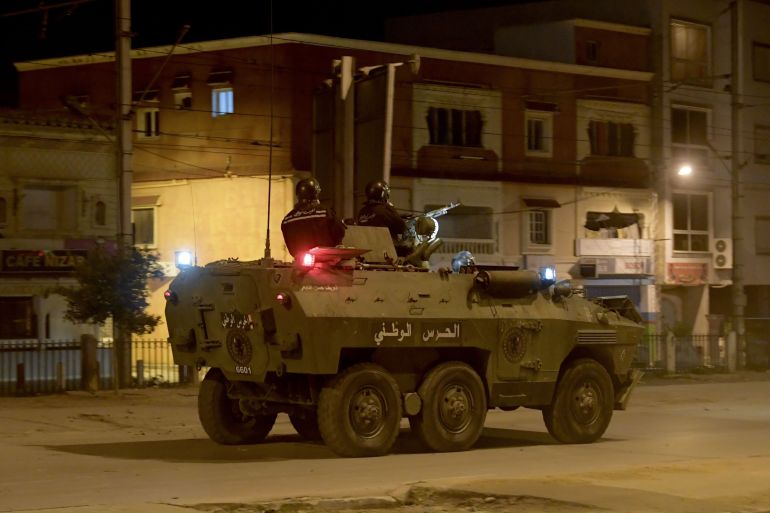Tunisia deploys army to help quell days-long unrest
Security forces’ deployment comes after mass arrests and days of violent protests by youth in various cities across the country.

Tunisia has deployed military units to help quell days-long social unrest that saw violent protests by young people in various cities, as demonstrators took to the streets to demand the release of hundreds of people arrested by police.
The defence ministry said on Monday said the situation in the country was “calm” after soldiers were called in the previous night to protect public buildings and “seats of sovereignty”.
Keep reading
list of 3 itemsTunisia arrests dozens as protests break out for second night
A decade after revolution, Tunisia’s women face an uphill battle
Tunisians are angry at the poor state of the economy and of public services. Many feel disappointed that on the 10th anniversary of the uprising that removed former President Zine El Abidine Ben Ali, little seems to have improved. There is also added frustration over coronavirus restrictions.
However, with no clear agenda, political leadership or backing from major parties, it is not clear whether the demonstrations will gain momentum or die down, as many previous rounds of protests have since 2011.
The defence ministry said the army will conduct joint patrols with security forces in the regions of Siliana, Kasserine, Sousse and Bizerte, where clashes with police broke out on Sunday evening for the second consecutive night.
Other cities that saw protests included Mahdia, Kairouan, Kebili, Nabeul, Manouba Gafsa and Monastir.
The interior ministry said authorities had made about 1,000 arrests since the start of the unrest.
In Tunis’s central Bourguiba Avenue, demonstrators on Monday said they wanted people arrested in recent days to be released.
“They call everyone who protests against the system a thief … We have come with exposed faces by day and not by night to say we want jobs … We want dignity,” said Sonia, an unemployed graduate who did not want to give her family name.
Protesters with her chanted, “No fear, no fear! The street belongs to the people!”
Demonstrators also gathered on Monday in Manzel Bouzaine, near the interior city of Sidi Bouzid where the self-immolation of a fruit vendor in late 2010 triggered the country’s revolution.
#Tunisia: Security forces must immediately refrain from using unnecessary & excessive force to disperse protesters in the capital and several governorates, against marginalization, police violence, poverty & lack of job opportunities.https://t.co/9Vv77rvZpt
— amnestypress (@amnestypress) January 18, 2021
Rights watchdog Amnesty International on Monday called for restraint, citing footage showing officers beating and dragging people they had detained and said authorities should immediately release Hamza Nassri Jeridi, a rights activist arrested on Monday.
“Security forces must immediately refrain from using unnecessary and excessive force to disperse protesters in the capital and several governorates, against marginalisation, police violence, poverty and lack of job opportunities,” it said.
Tunisia on Thursday commemorated the 10th anniversary since the flight into exile of iron-fisted Ben Ali, after a popular revolt that foreshadowed pro-democracy uprisings, strife and war in the region during what became known as the Arab Spring.
Long touted as the Arab Spring’s lone success story, Tunisians increasingly sense that the revolution has failed to deliver on its promises, including the development of the rural and less industrialised interior regions.
Despite numerous democratic elections, protests continue to break out, especially in the central and southern regions where youth joblessness reaches 30 percent and the poverty level is above 20 percent.
According to the Tunisian Forum for Economic and Social Rights, more than 1,000 demonstrations took place in November alone. Months of sit-ins paralysed production of oil and phosphate, a key resource, costing billions of dollars in lost state revenues.